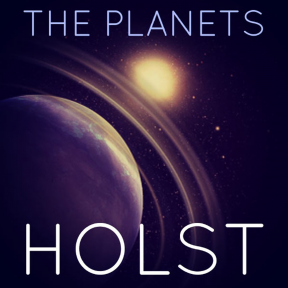[CLASSICAL MUSIC] The Planets - Gustav Holst

Gustav Holst had received modest success as a composer, but after his 1913 choral composition The Cloud Messenger was met with lukewarm reviews, Holst opted to take a trip with his friends Clifford and Arnold Bax. During the trip, Clifford Bax introduced Holst to astrology and the composer became fascinated with horoscopes, giving his friends readings throughout the rest of his life. This is often noted as the inspiration that led to Holst’s undertaking of a symphonic work that would later make him a legend.
Between the years of 1914-1916, Holst wrote six compositions for four-hand piano and later, a seventh for organ. The pieces were all based on the known planets of the solar system, excluding Earth. Noting the scope and magnitude of the planets, Holst opted to expand his “series of mood pictures” to full orchestral pieces. The results showed the influences of Schoenberg, Stravinsky, and Debussy and soon began to achieve acclaim through private concerts. It was not until 1920 that the full work had its first debut, and The Planets became an instant success.
Holst labels each section after a planet and its astrological character, but the musicality of each section seems to be more geared towards the influence of the planets on the psyche than on the Roman deities. Perhaps the most well known sections of the work are Jupiter and Mars. Jupiter has a memorable theme that was later adapted as a hymn tune. Mars has had a controversial history, with movie composers John Williams and Hans Zimmer utilizing similar motifs in their work. In fact, the estate of Gustav Holst sued Hans Zimmer due to the similarities of his soundtrack to Gladiator to the Mars movement.
You don’t see Pluto? That’s because it hadn’t been discovered when Holst wrote The Planets. Earth, the Sun, and the Moon are also not incorporated in the space journey, mainly because they are not part of traditional astrology.
The Planets has proved to the be seminal work of Gustav Holst, though he himself did not consider it to be his best. The modest composer did not fully appreciate the fame that accompanied the composition’s rave reviews, often greeting autograph seekers with a typed page explaining his refusal to grant their requests. Nevertheless, The Planets is the vital work in the legacy of Gustav Holst and is a key orchestral work in the 20th century canon.
I did an article on this too a while back! I learned a little bit of new info from your article though thanks for writing about it. Never knew the little bit about his reaction to the fame. New favorites always arise when I look back and listen to it. Recently I've gotten into Saturn really hard. I was lucky enough to catch a live performance of the whole suite a couple years back where they played images of the corresponding planets. Here's the one I wrote a little while ago.
https://steemit.com/recordpool/@mateonav53/steemit-recordpool-epic-classical-music-inspired-by-the-planets-in-our-solar-system
Your post has been supported and upvoted from the Classical Music community on Steemit as it appears to be of interest to our community. You can find details about us below.
The classical music community at #classical-music and Discord.
Follow our community accounts @classical-music and @classical-radio.
Follow our curation trail (classical-radio) at SteemAuto
This user is on the @buildawhale blacklist for one or more of the following reasons:
Hey @badcontent and @buildawhale, my account was phished and hacked. I just recovered it 2 days ago. Please take me off the blacklist.
Great post ! Thanks for sharing @sbrukh ! I’m a huge fan of Holst. I’ve also recorded and arranged Jupiter. Following you now 🙂
Your post received an upvote by the @illuminati-Inc music curation team and its partner @curie.
You may consider voting for the Curie witness; all witness payouts are used to fund Curie operations including but not limited to more than 10 curation teams (vote here).